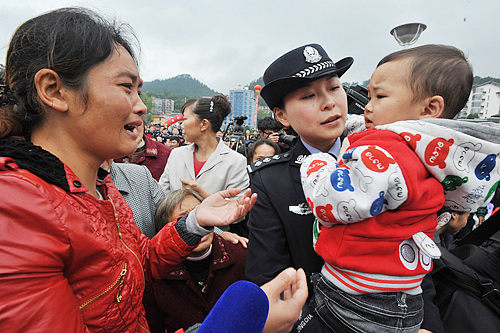|
 |
|
FAMILY REUNION: A police officer hands an abducted child back to his mother in Zunyi, southwest China's Guizhou Province, on October 25. On that day, 15 children were reunited with their families after the police arrested a child trafficking ring (WU DONGJUN) |
The Chinese mainland said on October 26 that a peace agreement is the inevitable future of cross-Taiwan Straits relations.
"Ending hostility across the Taiwan Straits and reaching a peace agreement is in line with the interests of the Chinese nation and is the common aspiration of compatriots on both sides of the Straits," said Yang Yi, spokesman for the State Council Taiwan Affairs Office.
Yang's statement follows remarks earlier in October by Taiwan leader Ma Ying-jeou, who raised the issue of a possible peace agreement and mentioned three preconditions that would allow Taiwan authorities to seriously consider it.
Yang said reaching a peace agreement has been the proposition of the mainland over the years.
The State Council, or China's Cabinet, approved on October 26 a plan to create a national vaccine provision system in order to enhance the country's ability to cope with epidemic emergencies.
According to the plan, a vaccine provision system that can supply regular use should be established by 2015.
By 2020, the system should be able to cope with emergencies and major epidemic situations as quickly and effectively as a developed country, said the plan.
China created 9.94 million new jobs in the first three quarters this year, exceeding its annual target of 9 million jobs, announced the Ministry of Human Resources and Social Security.
The country's registered urban unemployment rate was 4.1 percent at the end of September.
A total of 235 million residents had joined state-subsidized pension insurance programs by the end of September, while 66.94 million had started to receive pensions from these programs.
Pension programs for urban and rural residents would be implemented on a trial basis in 60 percent of the country's cities and townships by the end of this year and be introduced nationwide next year, the ministry said.
A team from Shandong Provincial Institute of Dermatology and Venereology in east China has identified two new risk variants near IL23R and RAB 32 genes that are responsible for the disease, according to a report published on the website of the scientific journal Nature Genetics on October 23.
Knowing that the two gene variants influence susceptibility to leprosy could allow doctors to diagnose the disease at an earlier stage and develop new treatments. A genetic database could now be built with details of people particularly susceptible to leprosy, said Zhang Furen, the leader of the research team.
The study involved the analysis of 10,000 samples taken from leprosy sufferers and healthy test subjects.
The Tibet Buddhist Theological Institute, the highest-level Buddhist theological academy in southwest China's Tibet Autonomous Region, opened on October 20.
The first 150 students include Living Buddhas and monks from various Tibetan Buddhist sects.
The institute provides three programs. Two programs focus on studies of Exoteric Buddhism and Esoteric Buddhism, respectively, while the other is tailored to Living Buddhas.
All students are required to attend classes on Buddhist, cultural and legal studies. The programs range from two to four years in length. | 